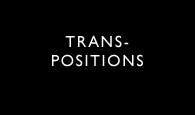The word ‘performance’ has received a bad rap in Christian circles. On the one hand, pastors and theologians warn us that we cannot earn salvation by performance, because salvation is a gift. On the other hand, a preeminent virtue among Christians (and society in general) today is authenticity, which often is pitted against mere show and performance. Either way, performance is bad; receiving salvation and living the salvation life with authenticity is good.
But if we are honest, performance is inevitable, and performance is not necessarily a bad thing. Performance is inevitable because life itself a drama (in fact, it’s a theodrama because God is the author and has the primary part) in which we have several roles to play depending on the relationships and interactions we have both inherited and freely chosen. And what is more, these roles—father, daughter, employer, gardener, pastor, plumber, etc.—are not masks concealing our true selves, but authentic ways to act out our identity in the comprehensive theodrama. Of course, those who trust in Jesus as the way, truth and the life have one overarching role—Christian—that gives shape to all the others.
So, being a Christian is a performance in the theodrama, but that does not mean that being a Christian is a matter of earning merit or being hypocritical. Do Christians struggle with performing their role to earn God’s favor or to put on a show before God and everyone else? Yes: if we are being honest, we all do. But this would constitute a poor performance of the Christian role. Faithful and fitting performances are responsive to God’s gracious action, not concerned with putting on a show, but seeking to conform our performance to the preeminent performance of Jesus.
To apply these ideas to one particular area of life, it is interesting to note several recent articles highlighting the ‘performative’ nature of social networking sites such as Facebook and Twitter. Peggy Orenstein at the New York Times surmises that we use these sites to construct a unique identity one pithy phrase and status change at a time. In short, Twitter becomes a way for putting on unique performances that set you apart from the other players on the world stage, easily digressing into an exhibition of fictions and falsehoods. Paul Burkhart at Pastrol agrees that Twitter is a performance, but accentuates the fact that this is nothing new, and that it does not destroy the roles we play in everyday relationships. Rather than contributing to inauthentic living, social networking sites like Twitter can actually contribute to faithful and fitting performances in the complex matrix of relationship in what we call life, or if you prefer, the theodrama.
Is Burkhart right? Do people use Facebook and Twitter to promote faithful and fitting performances in the theodrama, or do people mostly use these sites to build inauthentic identities of hypocritical self-expression? What is your experience in using Facebook and Twitter? Do you become someone you are not on these sites? Or do you use them to create a unique stage for your life performance, which you hope is neither hypocritical nor fake? Is your identity on Facebook ‘the real you,’ or is it someone you wish you could be? Are these sites contributing or inhibiting faithful and fitting performances in the theodrama?




One of the reasons I have avoided Facebook is because, in my view, it promotes a false view of relationships as people try to accumulate “friends,” which can end up meaning “anyone I might have met or can convince to pretend to know me.” In hearing from people I know talking about Facebook, it also appears that many people (though certainly not all) build their relationships on Facebook on trivialities like inane wall comments or games. This, combined with the fact that there have been numerous cases of completely false identities on Facebook, tells me that the site does not have a good effect on performance of life.
I don’t use Twitter, but I use my Google status message in a similar fashion to the way some people use Twitter. I’ll often put up a link to something I’ve read recently, comment on current events, etc. Although it certainly could lead to a false image, I think the more bare-bones focus on delivering a message to the world helps prevent the growth of falsity.
Thanks for your comment, Ben. But do you really think that people think their facebook ‘friends’ are on par with their real friends? Burkhart points out that facebook does not really undermine relationship, but gives another format for interacting with the friends you already have. I had your same reservations at first, but after awhile I realized that when used in moderation, facebook has not tempted me to stage a fake performance, but another stage to perform authentically.
Certainly not everyone thinks Facebook friends equivalent to real ones, but I object to the site’s use of “friend” to describe online connections (the business networking site LinkedIn uses the more accurate term “connections,” incidentally). I have also found that many people do try to accumulate as many “friends” as possible, or else approve everyone who wishes to friend them without considering too much whether there is any real basis for a relationship there.
I suppose I should also mention that I know my own weaknesses, and one of them is exploring databases. Facebook, among other things, is a worldwide database of the likes, dislikes, interests, etc. of millions of people. Wasting time finding out this data about people I don’t actually care about that much would be a significant temptation for me. Since I know the guy who started Patrol, for example, I would be tempted to explore everything on Facebook related to him and his fellow writers, even though I never actually cared that much for him at college. Another problem is that the masses of information on Facebook are all necessarily propositional knowledge. The knowledge in real friendship is not always, and can only be gained by time spent face-to-face, and that time disappears with too much time spent in the electronic world.
This is a deeply thought-provoking debate. I’m an avid Facebook user (certainly in danger of being an addict) but not unaware of its downsides. I use it to connect with other poets and artists, as well as real-life friends and family. I also use it to promote my poetry collection, readings, etc primarily through my so-called fan page.
I ought to be more disciplined about my use of it; I feel thinner in my self the more I visit Facebook throughout the day, but I also value the connections it creates and maintains, as well as the information it can lead me to. It’s a matter of controlling the anxiety of missing something, of being in or out. I don’t think FB generates that, but it foregrounds it. So, for me, there is a spiritual danger in FB. Or perhaps it is more that FB highlights and can play into an existing attachment.
Although I described myself as an avid user, I’m not a constant poster or commentator. Indeed, I’ve recently become a bit more circumspect about commenting, simply as a discipline, as a management of my FB time. I don’t post anything I wouldn’t want to read myself and I don’t get sucked into games and quizzes on the site. There’s no doubt that that means certain aspects of my so-called real self are highly visible on FB whereas others are invisible or absent. I’m circumspect about mentioning family, for example, because I can’t know who is reading the post.
A couple of FB “friends” have become real, offline friends, and I’m very glad of that.
Genuine depth of friendship must have a face-to-face element. Social networking can support the connection when real friends are apart or can be the gate to the path to the tete-a-tete, but a completely disincarnate friendship can’t ever have the emotional depth of real presence. That’s not to be conservative about the online life; it’s a fact of communication: just think about the enormous percentage that’s non-verbal. Not even through YouTube can you lay your hand on a friend’s.
Although, of course, information and knowledge are not the same thing. However, the pursuit of knowledge has always had a social element — peer review, conferences, this blog even. It’s perhaps no coincidence that Facebook began its virtual life in the academy.
Andrew, I think you have identified the paradox of facebook: that is has great potential and great danger. I am glad to here of the ways that you have utilized facebook beneficially, and thanks for your honesty about the difficulties. I’m curious about facebook friends becoming offline friends: how did that occur, and do you think that is a normal occurrence for others?
When someone I don’t know sends me a friend request, I always look at what FB friends we have in common to get some sense of where they’re coming from and why they might have made the request. Sometimes I also Google them.
However, as regards FB friends becoming offline friends, the main one I have in mind is the artist Douglas Robertson, who friended me after buying my book. It was obvious there was a strong connection in our interests, and I subsequently asked Doug whether he’d host a stop for my virtual book tour on his blog, which he did (see this post, if you’re interested). Shortly after that post, I met Doug in the flesh at a reading I gave in London. We got on really well and it transpired that we had a good number of acquaintances in common. We’ve continued to connect through Facebook and face to face when possible (Doug lives way down south and I’m in the Lothians), and he has continued to produce art responding to some of my work.
If it hadn’t been for Facebook, I might never have met Doug or, at least, if I had, the same strength of connection would probably not have been established so quickly. It would certainly have been harder to maintain without FB. To me, that demonstrates how the site can result in and support genuine friendship.
I’ve also been thinking about how I use my FB page and profile to help promote other writers’ and artists’ work: is it reasonable to describe that under the heading of generosity or grace in some sense? Of course, there are several aspects to it: I don’t recommend anything I’m not genuinely enthusiastic about; I’m well aware of how much peer support can mean to a writer; and, of course I hope for reciprocal support. So it’s not pure, unsullied generosity, but that’s the nature of the beast. Still, I think that kind of post helps to militate against the dangers of narcissism inherent in a forum such as FB! It’s about engaging rather than broadcasting, as Anna says.
thanks for your thoughtful post, Wes.
I find the concept of facebook “friends” who are not people I have not met and engaged with face to face a strange idea. If i enjoy someone’s work i usually engage with them through pages but not as a facebook “friend” unless I already know them. Facebook is a valuable tool for me to connect with my family and friends around the world. It has broken down many barriers to maintaining connections with those people whose lives and happenings I want to remain abreast but whom I am physically far from. I think it is important to evaluate whether you are being authentic in your engagement in any context and in this regard facebook is no different for me than evaluating whether I am being authentic in a face to face encounter.
I’ve begun to use twitter more in the last couple of months but I’m not really sure how it fits into my life. It is even more immediate than facebook and when i want to know what is important – trends in terms of what people are tallking about – then it can be interesting. I’ve been trying to think through how twitter is a tool for me to engage rather than merely broadcast.
To engage rather than broadcast…I like that distinction, and I think that is a good summary of faithful and fitting performances in the theodrama!
Thought-provoking, and while I’m not all that deep, as a student of ritual it’s nice to hear someone affirming that performance happens, whether everyone agrees it’s a good idea or not!
Thoughts on facebook – in my experience, the chief benefit of facebook is being able to continue what I might call a “real-time” relationship with the far-flung, whether that’s family, colleagues or (usually around here) good friends with whom one has spent several years “doing life” andwho might disappear suddenly. Of course there are emails, but those are not the same as plopping on a couch with your flatmate and talking about your day. They also tend to necessitate a kind of false performance, as it seems more like the one-man-show way to interact with the world. Something like facebook allows an interaction far closer to real-life, and I might venture that it is no more or less inane than what one might hear upon bugging the average kitchen. When there are people you see every day and like, while you may not have ample opportunity to become close there can be the foundations of a constructive relationship, and facebook allows both parties to remain open to communication as long as that desire is mutual.
This was never more apparent than when I was seriously ill and housebound last year – I got to know more of the incoming students than usual due to establishing contact in the real world before disappearing, and several genuine friendships were enabled to form because of the open-to-communication idea. Though I don’t “get” the random friend thing, either.
A lot of this has to do with the format of the site itself. I think, like many things, it’s a tool and one’s use of it determines the level of utility, but, as with tools, it’s easier to cut wire with wire-cutters than a hammer.